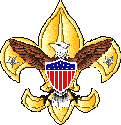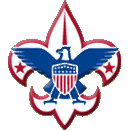| MERIT BADGES |
|
|
|
|
| Note: Eagle Required are in Italics |
"A"
American
Business
American Culture
American Heritage
American Labor
Animal Science
Archaeology
Archery
Architecture
Art
Astronomy
Athletics
Atomic Energy
Auto Mechanics
Aviation
"B"
Backpacking
Basketry
Bird Study
Bugling
"C"
Camping
Canoeing
Chemistry
Cinematography
Citizenship
Community*
Citizenship Nation*
Citizenship World*
Climbing
Coin Collecting
Collections
Communications*
Computers
Cooking
Crime Prevention
Cycling*
"D"
Dentistry
Disability Awareness
Dog Care
Drafting
"E"
Electricity
Electronics
Emergency
Preparedness**
Energy
Engineering
Entrepreneurship
Environmental
Science*
"F"
Family Life*
Farm Mechanics
Fingerprinting
Fire Safety
First Aid*
Fish & Wildlife Mgmt.
Fishing
Fly Fishing
Forestry
"G"
Gardening
Genealogy
Geology
Golf
Graphic Arts
"H"
Hiking
Home Repairs
Horsemanship
"I"
Indian Lore
Insect Studies
"J"
Journalism
"K"
"L"
Landscape Architecture
Law
Leatherwork
Lifesaving**
"M"
Mammal Study
Medicine
Metalwork
Model Design & Building
Motorboating
Music
"N"
Nature
"O"
Oceanography
Orienteering
"P"
Painting
Personal Fitness**
Personal Management*
Pets
Photography
Pioneering
Plant Science
Plumbing
Pottery
Public Health
Public Speaking
Pulp and Paper
"Q"
"R"
Radio
Railroading
Reading
Reptile & Amphibian Study
Rifle Shooting
Rowing
"S"
Safety
Salesmanship
Scholarship
Sculpture
Shotgun Shooting
Skating
Skiing
Small Boat Sailing
Soil & Water
Conservation
Space Exploration
Sports**
Stamp Collecting
Surveying
Swimming**
"T"
Textile
Theatre
Traffic Safety
Truck Transportation
"U"
"V"
Veterinary Medicine
"W"
Water Skiing
Weather
Whitewater
Wilderness Survival
Wood Carving
Woodwork
"X"
"Y"
"Z"
 Camping* Camping*Requirements 2000 |
- Show that you know first aid for injuries or illnesses that could occur while camping, including hypothermia, heatstroke, heat exhaustion, frostbite, dehydration, sunburn, insect stings, tick bites, snakebite, and blisters.
- Learn the Leave No Trace principles and the Outdoor Code and explain what they mean. Write a personal plan for implementing these principles on your next outing..
- Make a written plan for an overnight trek and explain how to get to your camping spot using a topographical map and compass..
- Make a chart showing how a typical patrol is organized for an overnight campout. List assignments for each member.
- Do the following:
- Prepare a list of clothing you would need for overnight campouts in warm weather and in cold weather.
- Discuss footwear for different kinds of weather and how the right footwear is important for protecting your feet.
- Explain the proper care and storage of camping equipment (clothing, footwear, bedding).
- Explain the term "layering".
- Present yourself with your pack for inspection. Be correctly clothed and equipped for an overnight campout.
- Do the following:
- Describe the features of four types of tents and bow to care for tents. Working with another Scout, pitch a tent.
- Discuss the reasons and methods for water purification. Discuss camp sanitation.
- Tell the difference between "internal" and "external" frame packs. Discuss the advantages and disadvantages of each.
- Discuss the types of sleeping bags and what kind would be suitable for different conditions. Explain the proper care of your sleeping bag. Make a comfortable ground bed.
- Prepare for an overnight campout with your patrol by
doing the following:
- Make a checklist of personal and patrol gear that will be needed.
- Prepare a camp menu that is right for backpacking.. Give recipes and make a food list for your patrol. Plan two breakfasts, three lunches, and two suppers. Discuss how to protect your food against bad weather, animals, and contamination.
- Pack your own gear and your share of the patrol equipment and food for proper carrying. Show that your pack is right for quickly getting what is needed first, and that it has been assembled properly for comfort, weight, balance, size, and neatness.
- Do the following:
- Explain the safety procedures when using a:
- Propane or butane/propane stove
- Liquid fuel stove
- Discuss the advantages and disadvantages of different types of lightweight cooking stoves.
- Cook for your patrol a trail meal requiring the use of a lightweight stove.
- Explain the safety procedures when using a:
- Show experience in camping by doing the following:
- Camp out a total of at least 20 days and 20 nights. (You may use a week of long-term camp toward this requirement.) Sleep each night under the sky or under a tent you have pitched.
- On any of these camping experiences, you must do
TWO of the following, only with proper preparation and under qualified
supervision:
- Hike up a mountain, gaining at least 2,000 vertical feet.
- Backpack for at least four miles.
- Take a bike trip of at least 15 miles or at least four hours.
- Plan and carry out a float trip of at least four hours.
- Rappel down a rappel route of 30 feet or more.
- On one of your campouts, perform a conservation project approved in advance by the private landowner or public land management agency.
- Discuss how the things you did to earn this badge have taught you about personal health and safety, survival, public health, conservation, and good citizenship.
|
||||||
Last Update May 15, 2023

.jpg)
